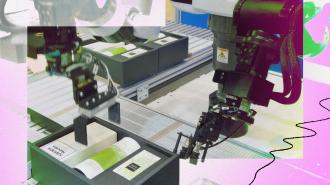AI will increasingly take over the boring parts of our work — but what will that actually mean for how we feel about our jobs, and ourselves? As Wharton School professor Ethan Mollick explored in an essay last year, the ‘Help Me Write’ button he tested for Google Docs is an easy way to create passable text. Just give that button a quick click, type a summary of what you want, and you can have AI do all your writing for you.
Microsoft is building something similar into Word, based on OpenAI’s highly capable GPT-4. Email app Superhuman proudly touts how its AI can write whole emails in your own tone of voice. All you have to do is summarize in a few words what you want the email to say. CEO Rahul Vohra says the average user makes use of it 25 times per week. But if we send a lot of email and take care to put our personality into those messages, doesn’t a feature like that suck the soul from our jobs, replacing it with a “plastic” replica?
As Mollick points out, once everyone has easy access to this technology in the apps they use every day, we’re a short hop from a world where AI-written emails respond to other AI-written emails. A world where once heartfelt job recommendations are AI-generated in seconds.
In some ways, it’s already going further. The Courts and Tribunals Judiciary for England and Wales recently published guidance making clear that judges are allowed to use generative AI when preparing legal rulings, as long as they are careful about how they do it.
And if judges are going to do it (and it seems some very much do), when the very point of their job is to create legal rulings drawing on their experience and authority, it’s worth asking what AI will do to the meaning of work.
What do we mean by “meaning of work”?
AI optimists often point to how technology takes away boring tasks and frees people up to do more challenging and interesting work. The arrival of the word processor killed the typing pool but it didn’t render professional typists permanently unemployed.
But having a job isn’t the same as getting a sense of meaning from one. And while money is a reward for work, it’s not necessarily what someone misses most if they lose their job, explains Eva Selenko, professor of work psychology at Loughborough University in the UK. Instead, she says, it’s the sense of purpose and responsibility, and the ability to meet other people, that they miss. “It gives us a place in society, it gives us an identity. Many people tell me ‘work is not my identity,’ but work is part of who we are, whether we like it or not.”
And while Selenko sees benefits in AI doing parts of people’s jobs more efficiently, she says there is evidence to show that automation can have a serious effect on our sense of meaning at work. For example, a 2021 study by academics in Germany looked at financial consultants whose job was to talk to customers, collect information from them, and then approve or deny their loan applications. They had full control over approval of a loan, drawing on their expertise and experience in the field.
When their employers installed AI software to automatically approve or deny loans with no way for a human to override the decision, the consultants’ role was essentially reduced to data entry and customer service. The study found experienced consultants felt threatened by the change, because it rendered them unable to help the customers with their creative problem solving skills. All they could do was relay a decision from a computer. The meaning they drew from their job was gone.
Replacing tasks with AI can destabilize workplace harmony, adds Selenko. “If certain tasks are replaced or supplemented, that can create stress, especially if you have been wedded to how you do things for a long time. It questions ‘how do we do things here’ and it’s not very comfortable if you’ve been doing things successfully for a long time. So especially for people who are very committed to certain procedures and processes, this will be more difficult, I anticipate.”
Selenko also points out that some tasks are not very creative or rewarding but they are relaxing, and help rest your brain before you do something more advanced. “The cheap cognitive tasks that you have to do, they’re actually good for you. Formatting your reference list is not necessarily very intellectual work, but it’s something that still needs to be done, and then you can turn to more creative, more in-depth work. So the question is, how will people cope with not having to do the routine things anymore?”
Meaning in an AI work-world
With AI likely to embed itself into an increasing number of jobs in the near future, how do we — workers and employers alike — ensure that a sense of meaning is maintained? Feeling satisfied in a job is important for teams, but it’s also important for leaders because unsatisfied workers are more likely to quit.
Here are a few possibilities for how this all shakes out:
#1 Adapt to find new meaning
When the financial consultants surveyed in the 2021 German study had the bulk of their job automated, some among the more experienced staff took the opportunity to minimize the amount of time they spent on the loan application. Instead they focused their interactions with customers on other financial services through which they could offer more professional value. Meanwhile, less experienced consultants found the AI allowed them to become better at their jobs because they hadn’t yet become seasoned advisers who were good at doing it the old way. So both groups shaped their work around the new technology to find new meaning.
#2 Embrace the new rewards
In some cases, jobs in the age of AI are likely to be just as rewarding, even if the work itself looks nothing like it used to. An example from recent history: libraries are very different places compared to what they were in the 1990s. When the internet went mainstream in the late 1990s, search engines transformed the role of librarians. They went from experts in cataloging and retrieving information, to experts in helping people navigate the sea of information readily available to them. It’s not hard to find librarians who take pride in their work in this new environment. The world still needs them, they just need to do something different.
#3 Amplify the human connection
AI can be useful for increasing efficiency, but it can’t necessarily do the more ‘human’ parts of a role, which are harder to quantify. Rachel Happe, an organizational and business strategist, gives the example of a sales lead generation role, which could be both a numbers game of creating leads, but also require a level of human connection to help turn those leads into customers.
If it’s the human connection that gives your sales job meaning, you might find that even if AI puts you out of a job, employers will soon want you back because software simply can’t replace the intangible value of what you do. “If your job is to interact with more leads, AI can replace that. You don’t even need to respond to emails now because of AI. What’s lacking in there is any kind of connection; that’s not what any metrics count,” says Happe.
“Good salespeople aren’t threatened by AI because they know it’s not about the content, it’s about the relationship. But if you’re not thinking very deeply, you miss that.” If employers discover that the factors which gave their teams a sense of purpose in their jobs were far more valuable to the company than cold, hard numbers ever revealed, meaning will find a way back.
#4 Track the research
Selenko isn’t worried about a sudden erasure of meaning from millions of workers’ lives. “I do not believe in doomsday or utopia scenarios. I believe in a more nuanced way of looking at it. Just because a certain task can theoretically be done by a large language model doesn’t mean it necessarily will be. There are many other factors at play as to when and why something will be replaced or not, like power, political strategy, cost, and so on.”
In the meantime, she believes more research is needed, and speculates on some of the risks that could be on the horizon. “We know very little yet. We know a little bit about job change due to AI, but we know very little, for example, about how it impacts wellbeing and stress. I think this is essential to know. We need to investigate.”
This article was reprinted with permission of Big Think, where it was originally published.






